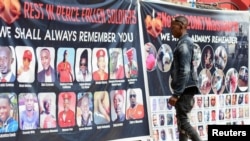Uganda's government is rejecting claims that top officials, including President Yoweri Museveni and his son, were responsible for the torture of political opponents.
The International Criminal Court this week received testimonies from hundreds of Ugandans who say they were tortured by officials.
A government spokesperson called it attention-seeking propaganda.
Uganda’s opposition party, the National Unity Platform, says it wants justice for people who allege they were tortured by the Ugandan government.
Speaking to VOA, NUP spokesman Joel Ssenyonyi said the party supports the many Ugandans who have provided testimonies in a case being presented to the International Criminal Court against top government officials.
The case was recently presented by Bruce Afran, a Princeton, New Jersey-based lawyer, whose team gathered the testimonies. The accusations stem from Uganda’s 2021 elections.
After the elections, several video clips shared on social media allegedly showed security officials torturing and, in some cases, firing live bullets at protesters.
Fifty-four people were killed during the campaign period, mostly in clashes between police and protesters after authorities stopped Museveni’s challenger, opposition leader Bobi Wine, from campaigning in eastern Uganda. A number of NUP activists were also arrested.
Museveni condemned the killings but stated that some terrorists had been killed.
Ssenyonyi said the president’s words showed that he was responsible for the arrests and torture.
“After that statement that he made, who has been called to order? How many people have been taken to jail or to court for torturing Ugandans?” Ssenyonyi said. “Two, he is the same person after the Arua incident, he said this Bobi Wine and others, they were beaten properly. Clearly showing, he is the one who commandeered all of these.”
In August 2018, while campaigning for an opposition candidate in Arua district, Wine narrowly escaped death when the driver of his car was shot and killed.
The shooting happened after opposition supporters allegedly stoned the president’s vehicle.
Among those who have given testimony in the case submitted to the ICC is writer Kakwenza Rukirabashaija, a Museveni critic who fled Uganda shortly after his third arrest.
After his release, Rukirabashaija posted pictures of his scarred body, saying he had been tortured and a pair of pliers used to pluck not just his nails but the skin between his thighs.
Rukirabashaija said the president's son, General Muhoozi Kainerugaba, visited him in prison and was responsible for the torture.
Rukirabashaija’s lawyer is Eron Kiiza.
“Kakwenza is sure that Muhoozi did torture him,” Kiiza said. “And it is clear that he supervised and ordered that torture.”
Farouk Kirunda, Museveni’s deputy presidential press secretary, said the NUP party has not sufficiently defended its allegations before the Uganda Human Rights Commission.
“It’s propaganda,” Kirunda said. “They have filed before in Uganda Human Rights Commission where they furnished a list of the said torture victims. But after making thorough investigations by Uganda Human Rights Commission, it was found out that the list was fake. So, it is political, those ones are seeking for the attention of the international community.”
Twenty-six top government officials are accused of participating in, aiding and abetting the detention and torture of opposition supporters during Uganda's 2021 election. The ICC has not indicated whether it will take up the case.




